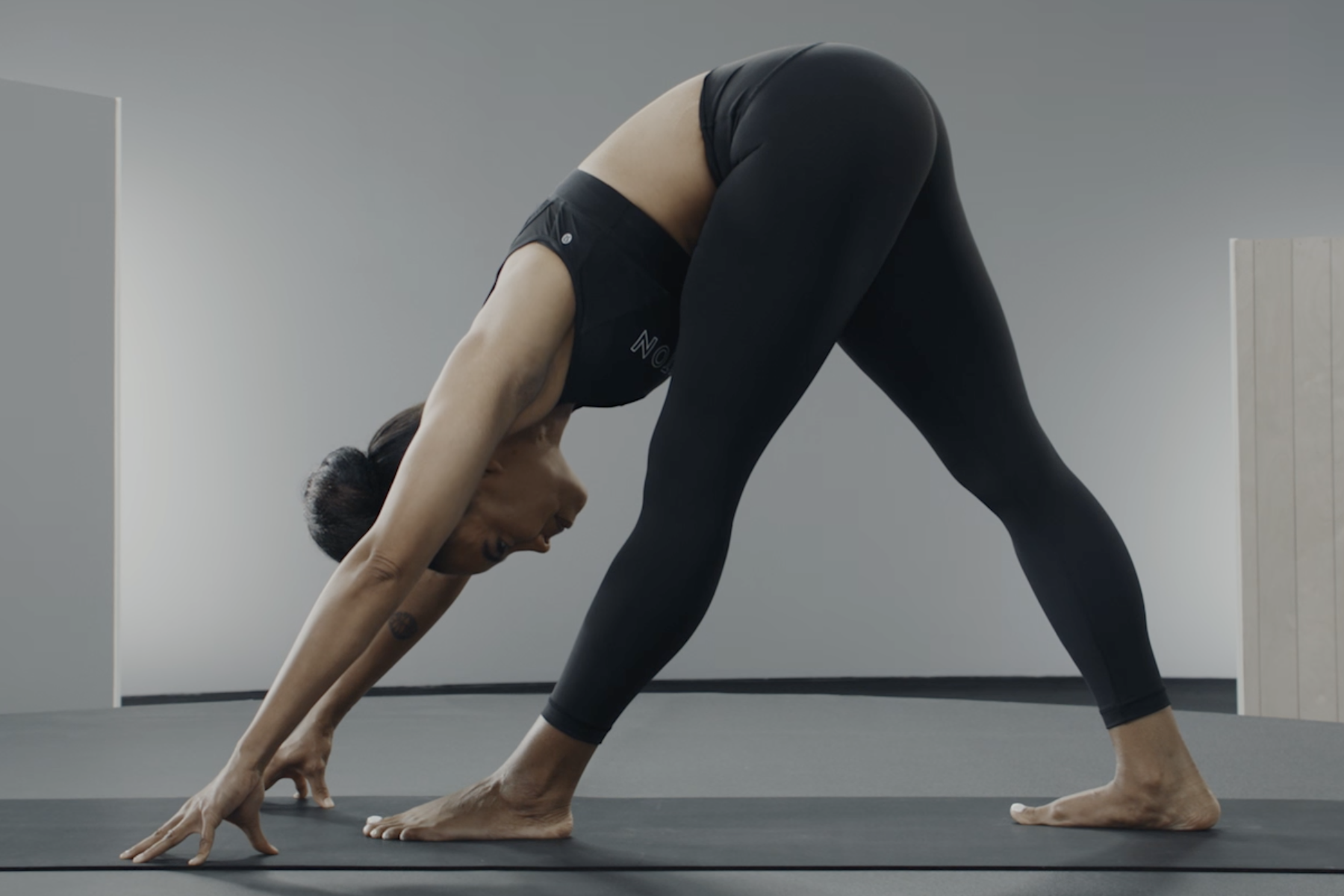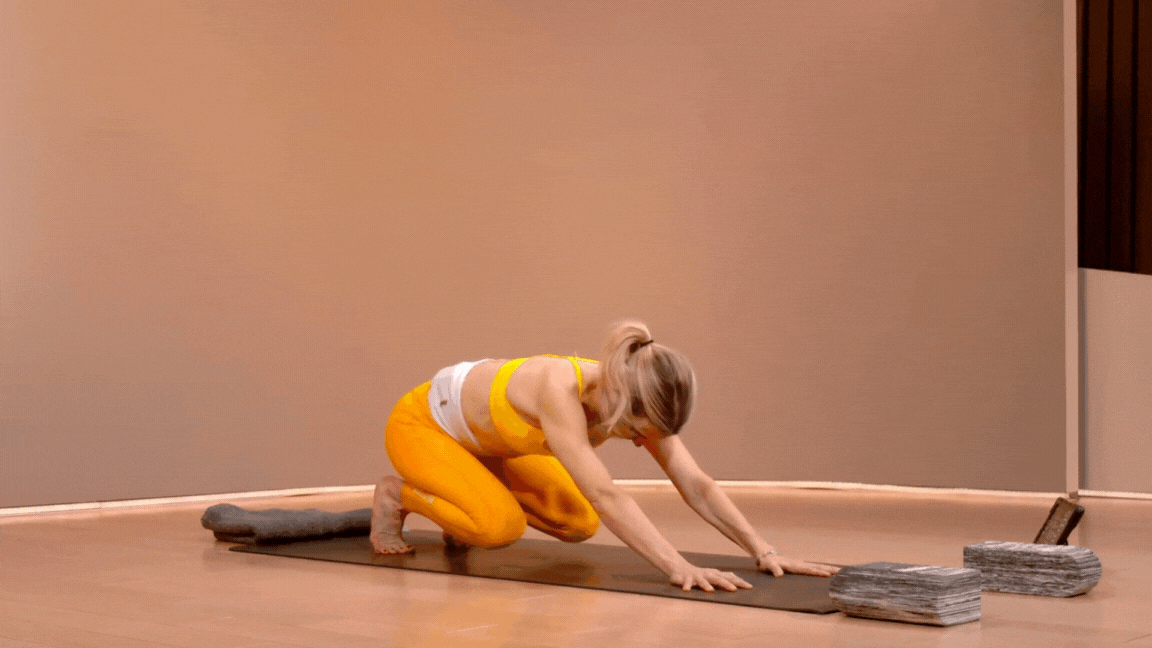
LPETTET/Getty Images
Level Up Your Golf Game with These 7 Yoga Poses
The key to a stronger golf swing? Spending time on the yoga mat.
By Elizabeth Millard•
Golfers, when you think about actionable ways to improve your swing, what’s the first thing that comes to mind? Lessons with a golf pro? Daily trips to the driving range? Whatever it is, we’re guessing it’s probably not yoga.
However, substantial progress comes from strengthening your core and improving your range of motion, both of which happen off the course (and, if we’re being specific, on the yoga mat). Here’s a look at how incorporating yoga into your regular routine can benefit your golf game, along with some key poses you can do to get started.
Is Yoga Good for Golfers?
There are several aspects of yoga that make the practice ideal for improving your golf game, according to Peloton instructor Kristin McGee. “Yoga can help with golf performance because it strengthens all of the muscles a golfer uses, right down to the hands and wrists," she says. For example, you can choose certain yoga poses that stretch, engage, and strengthen your core, arms, hips, glutes, legs, and lower back—all body parts you use while swinging a golf club.
Yoga can also help you harness your attention, whether you’re at a driving range or playing 18 holes. “Golf requires a lot of concentration. You can easily get distracted, and it can mess up your focus and impact your game,” Kristin says. Stepping onto a mat to do yoga, a moving meditation that’s also considered mindful movement, gives you an opportunity to practice focusing.
Here are some of the other benefits golfers can reap from doing yoga:
Strengthens Core Muscles
Certain yoga poses challenge your alignment and improve your balance, strengthening your core as you engage it to stabilize yourself. You use those same muscles, particularly your obliques, as you make the twisting motion required to swing a golf club.
Improves Range of Motion
Poor mobility can limit the power behind your golf swing and prevent you from progressing. Luckily, you can do yoga poses to gradually improve your range of motion.
What’s more, most yoga poses simultaneously engage several muscle groups, meaning they can help counteract imbalances in the body. That's a big deal since golf is a one-sided sport, according to Neel Anand, MD, an orthopedic surgeon and director of spine trauma at Cedars-Sinai Spine Center in Los Angeles, California.
"Golfers absolutely need to make sure they're training in a way that reduces how much stress they're putting on just one side of the body, especially in the back and shoulders," Dr. Anand says. "An activity like yoga can build greater range of motion for both sides of the body and alleviate tension in the back as well."
Increases Control Over Your Breath
Like most athletes, golfers can benefit from using their breath as a tool to boost mental focus and concentration. "Yoga breathing and focus can definitely help a golfer stay more present. When you’re connecting your mind, body and breath, you feel fully immersed in the moment,” Kristin says.
Breathing techniques, especially Ujjayi Breathing, can be particularly useful during a close round. “Yoga also reminds us to soften when things feel tense. We get into an uncomfortable pose and learn how to breathe through it. When we are on the golf course, we can use that same relaxing breath to let go of tension and pressure,” Kristin says. What’s more, breathing with more awareness can also lead to more consistent energy levels (aka less fatigue during a long day of golf).

Peloton App
Access thousands of classes with no equipment needed.
How Often Should Golfers Do Yoga?
Ready to step onto the mat and build a yoga practice? Kristin recommends that golfers do a sequence of yoga poses at least twice a week to open tight areas and build strength that supports their game. To get started, work two or three poses from the list below into your pregame warm-up.
7 Yoga Poses for Golfers
Although there are so many yoga poses that engage the muscles you use on the golf course, we put together a list of seven of our favorites (with a special emphasis on postures that engage your core).

Supine Twist Pose (Supta Matsyendrasana)
Doing this pose on the floor helps you relax as you twist and improves your range of motion.
Lie on your back and bend your knees so the soles of your feet are on the floor. Position your arms in a “T” shape with your palms facing up.
Press into your feet to lift your hips slightly off the floor and shift them about an inch to your right. This helps stack your hips when you move into the twist and removes pressure from your lower back.
Cross your right leg over your left.
Drop your legs gently to the left, making sure your right shoulder stays on the floor.
Stay in this position between 30 seconds and a minute. Then come back up and recenter your hips while uncrossing your legs.
Repeat the above steps on the other side.

Pyramid Pose (Parsvottanasana)
This folding posture stretches your waist and shoulders while strengthening your legs and core.
Stand with your hips squared. Step one foot back about two to four feet. Your back foot can stay pointing straight or at a 45-degree angle, based on what feels comfortable.
Keep your hips facing forward as you interlace your hands behind your back with your arms extended or in a reverse prayer.
Hinge forward at your hips, folding forward toward your front thigh. Focus on expanding your chest. Take a few breaths before returning to your standing position.
Repeat on the other side.

Downward-Facing Dog (Adho Mukha Svanasana)
According to Kristin, this pose strengthens and stretches your entire body. It also helps alleviate tension in your shoulders and calves.
Start in Table Top Pose (Bharmanasana).
Stretch your legs back to come into plank position. Then lift your hips upward while pressing into your hands. Keep your head in a neutral position and your ears in line with your biceps.
Put a slight bend in your knees to keep tension out of your lower back and focus on keeping equal pressure between your hands and feet.
Hold for three to five breaths.

Cat Pose (Marjaryasana) and Cow Pose (Bitilasana)
As these two poses flow into each other, they can reduce tension in your lower back and shoulders while also strengthening your wrists.
Start in Table Top Pose with your shoulders over your wrists and your hips over your knees.
Take a slow inhale, and on the exhale, round your spine and drop your head toward the floor to enter Cat Pose.
Inhale and lift your head, chest, and tailbone toward the ceiling as you arch your back to enter Cow Pose.
Continue to flow between Cat Pose and Cow Pose for three minutes, paying attention to your breath.

Mountain Pose (Tadasana)
“Mountain Pose is a way to ground yourself and connect with your breath,” Kristin says. You can even practice this posture on the golf course as a way to reset and focus.
Stand with your feet either shoulder-width distance apart or hip-width distance apart, whatever feels most comfortable. Place a slight bend in your knees.
Shrug your shoulders up by your ears. Then, imagine your shoulder blades coming together and relaxing downward to get your shoulders into a neutral, relaxed position.
Bring your arms to your sides with your palms facing forward, providing an added shoulder release.
Breathe mindfully for between 30 seconds and a minute.

Revolved Lunge Pose
On its own, a lunge is a boon for your leg muscles, and Kristin says throwing a twist into the mix makes it an “incredible pose to strengthen the thighs and core while also opening up the shoulders.”
Stand with your feet hip-width distance apart.
Step your left leg back until you're in a lunge position, with your right knee bent at a 90-degree angle.
Hinge at your waist as you learn forward toward your right leg.
Twist toward the right, putting your left hand on the ground or on a yoga block. Your left hand can extend toward the ceiling or wrap backwards onto your low back to open your shoulders.
Hold this position for three to five breaths before switching sides.
The Takeaway
Putting in work on the yoga mat can translate to a better performance on the green—and you don’t have to be uber flexible or own a lot of equipment to experience yoga’s benefits. All you have to do is start. So, try each of the poses above to determine which ones feel good for your body and take plenty of modifications. If specific muscles feel tight during a round, seek out gentle yoga poses that directly target those areas. And if you experience persistent pain or discomfort while golfing, consider visiting a medical professional.
Try a Yoga Class On the Peloton App
See all classesThis content is for informational and educational purposes only and does not constitute individualized advice. It is not intended to replace professional medical evaluation, diagnosis, or treatment. Seek the advice of your physician for questions you may have regarding your health or a medical condition. If you are having a medical emergency, call your physician or 911 immediately.
This content is for informational and educational purposes only and does not constitute individualized advice. It is not intended to replace professional medical evaluation, diagnosis, or treatment. Seek the advice of your physician for questions you may have regarding your health or a medical condition. If you are having a medical emergency, call your physician or 911 immediately.
Want to strengthen your yoga practice?
We can help. Enter your email to get articles, instructor tips, and updates from Peloton sent to your inbox.
By providing your email address, you agree to receive marketing communications from Peloton.
For more about how we use your information, see our Privacy Policy.









